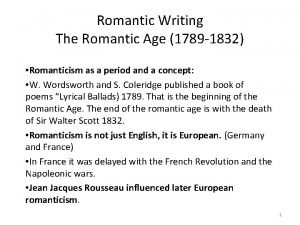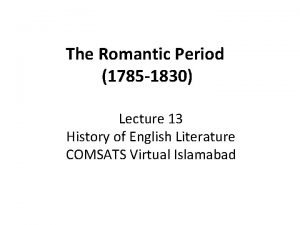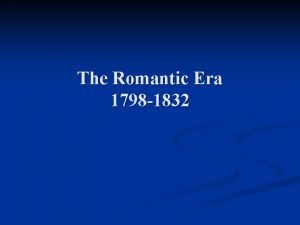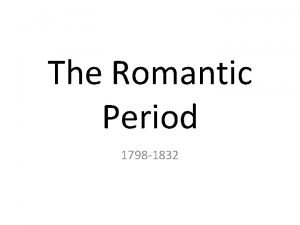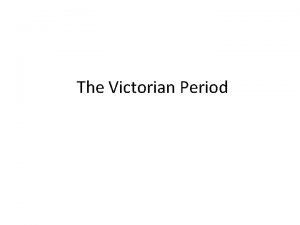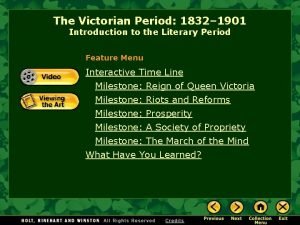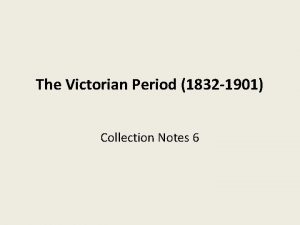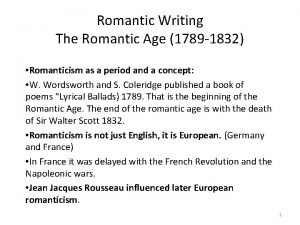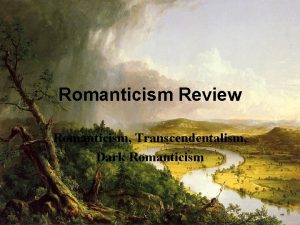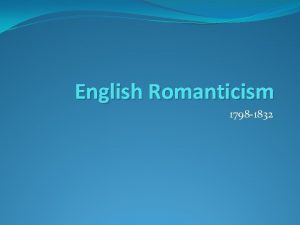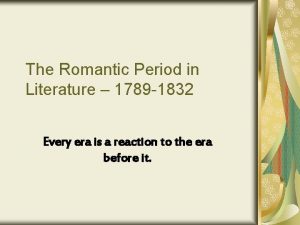Romantic Writing The Romantic Age 1789 1832 Romanticism










- Slides: 10

Romantic Writing The Romantic Age (1789 -1832) • Romanticism as a period and a concept: • W. Wordsworth and S. Coleridge published a book of poems “Lyrical Ballads) 1789. That is the beginning of the Romantic Age. The end of the romantic age is with the death of Sir Walter Scott 1832. • Romanticism is not just English, it is European. (Germany and France) • In France it was delayed with the French Revolution and the Napoleonic wars. • Jean Jacques Rousseau influenced later European romanticism. 1

Romantic Writing The Romantic Age (1789 -1832) • Modern and old meaning of romance: • Because tales involved amorous encounters between a knight and his lady, sprang the modern meaning of romance. The older sense is rather the charming, magical world a ‘freely imaginative idealizing fiction’ and not love between men and women. 2

18 th C. The Age of Swift, Pope and Johnson The Romantic Age • Stressed reason and judgment • Emphasized imagination and emotion • Concerned with the general and the universal in experience • Concern with the particular • Values of society as a whole • Value the individual human being • Followed authority and rules • Strove for freedom • Inspired by classical Greek and Romantic authors • Interest in medieval subjects and settings 3

Romantic Writing The Romantic Age (1789 -1832) • W. Hazlitt: “The romantic age is a time of promise, a renewal of the world of letters”. • P. Shelley in his Defense of Poetry: “The literature of the age has risen as it were from a new birth”. • The romantic age is a period of enormous literary energy in England. • To understand the period, we must examine the main political and social background. 4

The Romantic Age Historical Background • Two revolutions had a profound effect on 18 th and 19 th C thinking in England: • 1 - The revolution of the English colonies in America against the economic and political control of the mother country. (1775 to 1783) • 2 - The French revolution (1789) • Although both revolutions happened abroad, but the victory of the American movement was a blow to the British confidence. It is however philosophically less threatening than the French Revolution. Discuss. 5

The Romantic Age Historical Background • The French revolution overthrew the government of a great European power from within • Whereas the American Revolution is a distant disorganized group of colonies. • French Revolution is a victory of more radical democratic principles than those enunciated in the American Declaration of Independence. • English liberal saw in the ‘early’ stages of the Fr Rev, in the declaration of the rights of Man “Fraternité, egalité et liberté”, in the storming of the Bastilles on July 14 th 1789 , to release the French prisoners, a triumph of popular democracy. 6

The Romantic Age Historical Background • This promise and expectation soon withered into disappointment when revolutionary extremists gained control of the government in 1792 and executed hundreds of the imprisoned nobility in the “September Massacres”. • 1793: Louis XVI was executed and the “reign of terror” under Robespierre was established, during which thousands of those associated with the old regime were guillotined. 7

The Romantic Age Historical Background • France offered armed assistance to all countries desiring to overthrow their present governments. • Napoleon Bonaparte rose among this havoc and brawl. The champion of the revolution turned into a tyrannical despot who strove to conquer Europe. • In the Prelude, Wordsworth expressed his disillusionment and despair. “Frenchmen had changed a war of self-defense for one of conquest, losing sight of all which they had struggled for. . ” 8

The Romantic Age Historical Background • Defeat of Napoleon at the battle of Waterloo 1815 → Triumphant celebration of the conservative forces ruling England. • Byron and Shelley, who once sympathized with the Fr Rev ideals, believe that it is the defeat of one despotic power (France) by another despotic power (England). 9

The Romantic Age Industrial Revolution • Important transformation of the European society. • Most writers were deeply affected by the promise and disappointment of the Fr Rev and of the effects of the Industrial Revolution. The urbanization of the English rural life and landscape and the exploitation of the working class, created a lamentable proletariat. • Historically it is a time of soaring aspiration and of bitter disappointment, rather than progress and achievement. • Yet in Romantic literature, it is often the very expression of aspiration and disappointment that constitutes literary achievement. (later discussion, after covering RW) 10
 Bolton romanticism amp; politics 1789 1832 download
Bolton romanticism amp; politics 1789 1832 download The romantic period 1798 to 1832 summary
The romantic period 1798 to 1832 summary 5 i's of romanticism
5 i's of romanticism The romantic period 1798 to 1832 summary
The romantic period 1798 to 1832 summary The romantic period 1798 to 1832 summary
The romantic period 1798 to 1832 summary Romantic age starts from
Romantic age starts from Romantic period 1798 to 1832
Romantic period 1798 to 1832 Ceremoniality
Ceremoniality The victorian period (1832–1901)
The victorian period (1832–1901) Victorian age introduction
Victorian age introduction Victorian age 1832 to 1901
Victorian age 1832 to 1901
